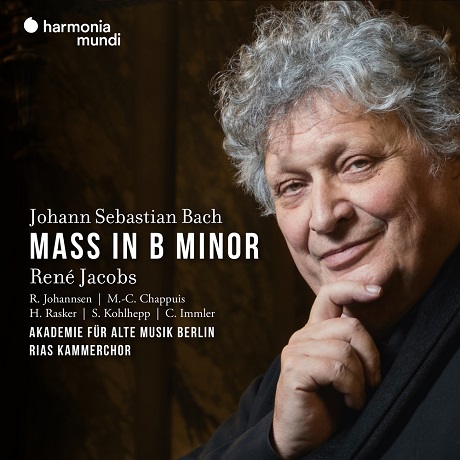Having enjoyed René Jacobs’ superb recording of Beethoven’s Missa Solemnis which was issued by harmonia mundi in 2021, I was looking forward to this new account of Bach’s Mass in B minor. The French record label has already produced at least four versions of the Mass, and this latest one is dedicated to the memory of Eva Coutaz, the wife of harmonia mundi’s founder, who oversaw the label’s artist and repertoire policy for some 30 years.
Jacobs’ first recording of Bach’s masterpiece dates from 1992 (also with Berlin’s Akademie für Alte Musik and the RIAS-Kammerchor), and while that version has some distinguished names amongst its soloists, this new account presents fresh ideas on the use of the chorus. In his booklet note Jacobs explains his urge to develop further the concept of ‘vocal concerto grosso’ outlined in 1960 by the scholar Wilhelm Ehmann in an essay entitled ‘”Concertisten” und “ripienisten” in der h-moll- Messe Joh.Seb. Bach’. Consequently, Jacobs models this performance on Ehmann’s notions of alternating choral sonorities, wherein small (concertino) and larger (ripieno) groups are juxtaposed within the various tutti movements. For this he roughly halves the 29 tutti singers of the RIAS-Kammerchor assigning them to those sections of the Mass considered to be of a concertante nature. As a means of refreshing the ear this mostly works well, yet Jacobs’ sound musical intelligence is rooted more in a well-argued theory than solid historical evidence.

Among the many instances where Jacobs deploys a smaller vocal ensemble is a somewhat pedestrian ‘Et in terra pax’, occasionally enlivened (or impaired depending on your point of view) by one of three tenors erupting from the textures in the manner of a soloist. Elsewhere, soloists and the tutti chorus alternate in quick succession for the ‘Cum Sancto Spiritu’, where Jacobs nicely shapes its cumulative drama, albeit for a disappointingly lame final chord.
Regrettably, and with few exceptions, the choruses fail to convince, most notably in ‘Gratias agimus tibi’ and ‘Dona nobis pacem’, where their forthright delivery robs the music of any grandeur or gravity. I can’t hear Jacobs taking the performers to a special place or attempting to reach beyond the notes on the page. If these sections feel slightly cursory, then the ‘Sanctus’ will come as a shock, its breakneck tempo alarming to the point of incredulity. It was this movement that Donald Tovey described as ‘representing the swinging of censers by the angelic seraphim’. If that conjures something majestic then these angels would need a restraining order. When the soloists break in with ‘pleni sunt coeli’, tempi verge on the homicidal. However, sanity is restored for the ‘Osanna’, although its initial fleetfooted manner yields to something more laboured. On the plus side, the opening of the ‘Credo’ is silky smooth and the transition from ‘Confiteor’ to ‘et expecto’ is handled well and brings mounting excitement.
Amongst the solo numbers alto Helena Rasker impresses in ‘Qui sedes ad dexteram’, her jewel-like timbre not dissimilar to a countertenor, even in tone, notwithstanding a slight vibrato near the top of the stave. Christian Immler’s ‘Et in Spiritum sanctum’ is well projected and, like ‘Qui sedes’, is supported by some stylish oboe d’amore playing. There’s nimble finger-work from violinist Bernhard Forck in ‘Laudamus te’ and a sunny countenance from mezzo-soprano Marie-Claude Chappuis whose untutored diphthongs mar an otherwise pleasant rendition. The standout partnership belongs to soprano Robin Johannsen and tenor Sebastian Kohlhepp for their ‘Domine Deus’, much aided and abetted by Christoph Huntgeburth’s scintillating flute. It’s a collaboration of stylish playing and singing that would bear repeated listening but for its unstable rhythm which slips noticeably about halfway through – bar 55 in the Bärenreiter vocal score. A flexible metre is also a feature of the opening ‘Kyrie’, its measured but rhythmically wayward opening tempo only becoming settled with the entry of the voices.
Some of the finest moments are when the soloists sing as an ensemble, most persuasively in an intensely wrought ‘Qui tollis peccata mundi’. If the ‘Crucifixus’ doesn’t quite tear at our souls (Jacobs’ slower tempo in his 1992 recording provides more emotional desolation), it finds an accommodation between haunting stillness and overt melodrama.
Overall, this version offers a curate’s egg experience and will be unlikely to supplant existing recordings in your affections. While there are some distinctive movements (some for the wrong reasons), when gravitas and magnificence are most needed they are only partially realised.
David Truslove
J. S. Bach – Mass in B Minor BWV232
Robin Johannsen (soprano), Marie-Claude Chappuis (mezzo-soprano), Helena Rasker (alto), Sebastian Kohlhepp (tenor), Christian Immler (bass-baritone), RIAS-Kammerchor, Akademie für Alte Musik Berlin, René Jacobs (director)
harmonia mundi HMM 9027676.77 [1:44:00]